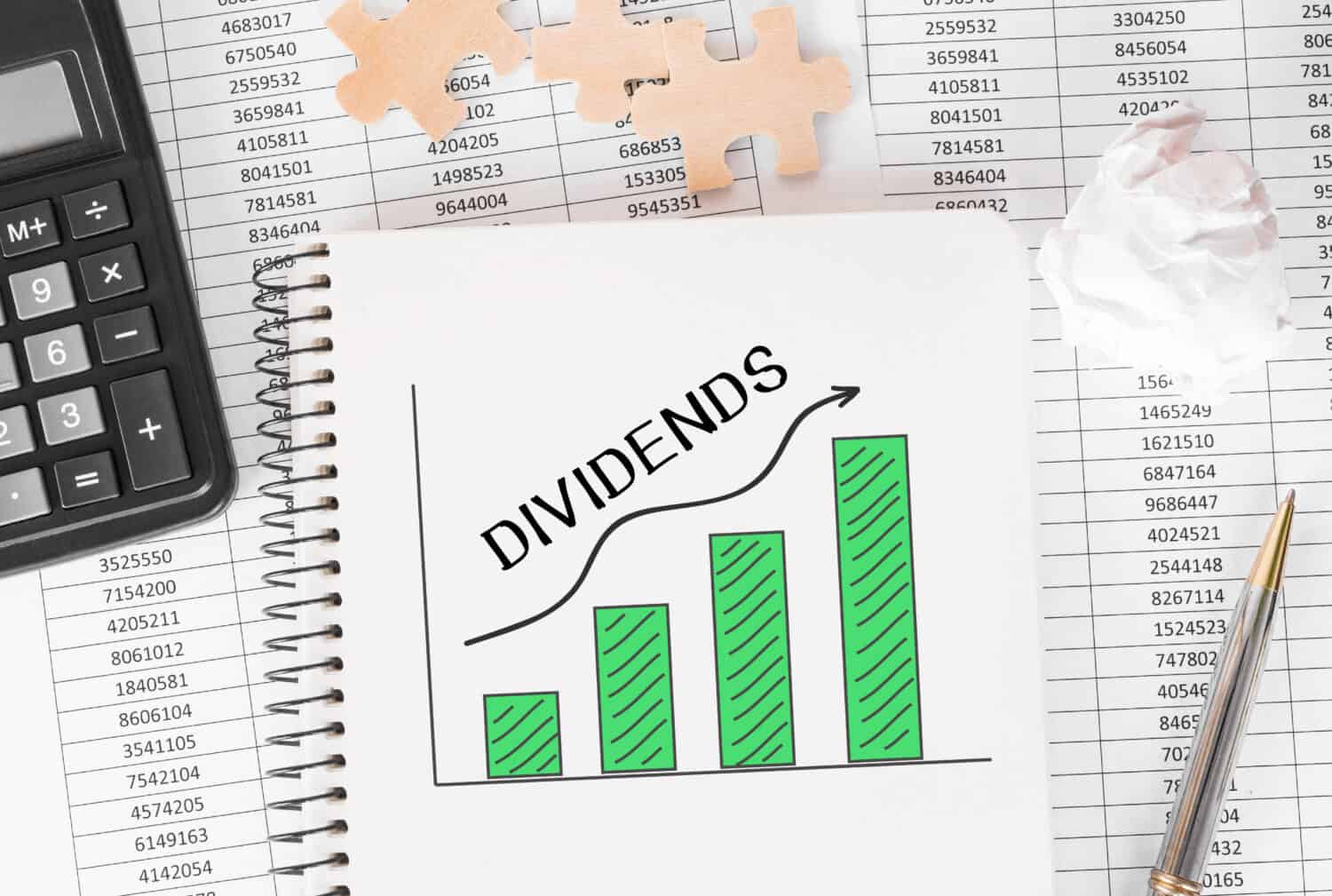
24/7 Wall Street Insights:
- Dividend stocks historically comprise as much as 33% of S&P 500 returns.
- If a dividend seems “too good to be true”, exercise caution and proper due diligence – it may be only valid for the moment due to outlier circumstances and not a perennial amount.
- Access our free report on two high dividend stocks here.
Prevailing interest rates have risen over the past few years, following the surging rates of inflation. Certificates of Deposit, usually referred to as CDs, are often the highest yielding conventional banking investments offered to retail investors. Recent offerings from regional banks range from 4.50% to 5.35% annual yield, but have a minimum deposit amount of $5,000. At the time of this writing, one of the higher yielding CDs from a nationally known entity is a 5.0%, 12 month offering from Goldman Sachs. However, when one reads the fine print, things are not quite what they seem:
“Annual Percentage Yield (APY) may change before CD is opened and funded. Penalties that may reduce CD earnings will apply to a withdrawal of principal prior to maturity.” (italics mine)
In other words, while it is understandable that you are entitled to 5.0% on the CD as advertised, the APY may shrink between the time you open the CD and deposit funds and when Goldman Sachs actually credits the account. Additionally, the early withdrawal penalty, which is unspecified, can deduct from the prorated 5% you were supposed to get on paper, and could easily take as much as 100 basis points, which would equate to a 20% haircut.
Why Dividend Stocks May Be a Better Alternative For Passive Income

Investors who seek passive income to augment their household paychecks usually want their investments to offer a combination of each of these categories: principal safety, high liquidity in the case of emergencies where funds may be needed quickly, comparatively high yields, and transactional ease of entry and monitoring, in terms of order execution and being able to check status at any time.
Dividend stocks, which come in a variety of offerings from every industrial sector, satisfy all of these requirements at various risk tolerance levels for each of these category ranges. Although there is market risk to a percentage of principal with stocks, there is also a fair chance of capital appreciation. In addition, there are no penalties if one has to sell early, and liquidation is an easy T+2 at the time of this writing, with T+1 next day settlement scheduled to commence at the end of May, 2024.
24/7 Wall Street has an extensive database of dividend stocks and has published a number of articles listing different types to suit all investment sector interests. In addition to the above mentioned attributes, here are three dividend stocks to consider that would deliver over 7.0% APY at the time of this writing. Just for comparison’s sake, we will base each on a $5,000 investment, which would yield $250.00 per year on the Goldman Sachs CD if held to full 1 year maturity.
ClearBridge Energy Midstream Opportunity Fund Inc

Stock #1 : ClearBridge Energy Midstream Opportunity Fund Inc (NYSE: EMO)
Yield: 8.28%
Shares for $5,000:~116.6
Annual Dividend Amount: ~$414.00
Oil drilling companies are routinely romanticized in literature and on screen with films like There Will Be Blood and Oklahoma Crude. However, finding oil is only part of the story. In the real world, getting oil to a refinery in order to make gasoline, kerosine and all other petroleum based products that people will buy is the next step. After that, transporting the various products to warehouses for subsequent retail sale is how oil actually becomes a commodity of value.
As a result, the myriad companies involved with storage of natural gas, oil and refined petroleum and energy products in tankers or other storage units and transporting it via pipeline, maritime tanker, rail or truck – referred to as oil and gas midstream companies – are all extremely important in the supply chain, and all quite lucrative. Many of these companies are Limited Partnerships that became listed as publicly trading stocks.
ClearBridge Energy Midstream Opportunity Fund Inc. is a closed-end mutual fund managed by Legg Mason, a subsidiary of Franklin Resources, out of New York City. The fund invests in public US companies, primarily Limited Partnerships and Master Limited Partnerships. As an investment fund that takes no active management in any midstream operations, ClearBridge Energy Midstream Opportunity Fund Inc. gets to participate in the revenue streams of the companies on the front lines without any of the liabilities of a potential oil tanker leak like the Exxon Valdez disaster or a gas pipeline explosion from an accidental ignition.
Broadstone Net Lease, Inc.

Stock #2 : Broadstone Net Lease, Inc. (NYSE: BNL)
Yield: 7.40%
Shares for $5,000: ~318.9
Annual Dividend Amount: ~$370.00
Real Estate Investment Trusts (REIT)s are a novel way for individual investors to participate in commercial real estate rent rolls on a prorated basis but without the high admission ticket of having to purchase brick and mortar properties, the liabilities, costs, and work to maintain those properties, and the diversification advantage of multiple properties, vs the all or none risks to a single property. REITs are SEC registered entities that are required to remit 90% of profits to its shareholders for tax purposes.
Broadstone Net Lease Inc. is a REIT that specializes in commercial properties. Headquartered in Victor, NY, Broadstone Net Lease manages 759 properties across 44 states and 4 Canadian provinces. The sector breakdown of its portfolio is as follows:
- Industrial – 54.2% (Manufacturing: 17.5%. Warehouses: 14%, Food Processing: 12.5%, R&D: 4.3%, Automotive Services: 3.2%, Cold Storage: 2.7%)
- Restaurant – 14.2% (Casual Dining: 7.3%, Fast-Food: 6.9%)
- Healthcare – 13.4% (Healthcare Svc: 3.2%, Veterinary: 3%, Clinical: 2.7%, Surgical: 2.3%)
- Retail – 11.9% (General Merchandise: 6.6%, Automotive: 3.2%, Home Furnishings: 1.9%)
- Office – 6.3% (Strategic Operations: 2.9%, Corporate H.Q.: 2.3%, Call Centers: 1.1%)
Broadstone’s $5.2 billion portfolio holds solid performance metrics, boasting 99.4% occupancy and 99.2% rent collections as of the end of 2023. The Yearly WALT (Weighted Average Lease Term) is 10.6 years, and annual escalations are 2.0%. Investors might be interested to know that its latest quarterly report in May 2024, delivered 35 cents per share earnings, a 103% EPS sum over analysts’ predictions.
First Interstate BancSystem, Inc.

Stock # 3 : First Interstate BancSystem, Inc. (NASDAQ: FIBK)
Yield: 6.75%
Shares for $5,000:~180.8
Annual Dividend Amount:~$337.50
For a more apples-to-apples comparison of banks, the dividend yield of First Interstate BancSystem, Inc. is roughly 30% higher than the aforementioned CD. Founded by Homer Scott in 1968 and based out of Billings, MT, First Interstate BancSystem has branches in AZ, CO, ID, IA, KS MN, MO, MT, NE, ND, OR, SD, WA, and WY.
First Interstate BancSystem provides a full catalog of banking services to individuals, institutions, and municipalities, covering sectors such as real estate, agriculture, construction, education, healthcare, hospitality, government services, professional services, retail, tourism, insurance, technology, and wholesale trade.
Services include, but are not limited to: savings, checking, online banking and various other types of accounts, business equipment and property financing, credit cards, commercial and individual loans, trust services, and non-profit organization services.
In its most recent quarterly report at the end of April 2024, First Interstate BancSystem Inc. showed earnings up 15%, but more impressively, profits were up 25% on reduced costs, indicating managerial improvements for greater efficiencies.
Like any other stock portfolio, it is prudent to monitor performance on a regular basis. This is probably the biggest difference between stocks and CDs, which are pretty much a “leave it and forget about it until you get a renewal notice” kind of scenario. However, the higher yields and potential for capital appreciation make dividend stocks an overall more advantageous investment for any investor’s purposes.
Get Ready To Retire (Sponsored)
Start by taking a quick retirement quiz from SmartAsset that will match you with up to 3 financial advisors that serve your area and beyond in 5 minutes, or less.
Each advisor has been vetted by SmartAsset and is held to a fiduciary standard to act in your best interests.
Here’s how it works:
1. Answer SmartAsset advisor match quiz
2. Review your pre-screened matches at your leisure. Check out the advisors’ profiles.
3. Speak with advisors at no cost to you. Have an introductory call on the phone or introduction in person and choose whom to work with in the future
Thank you for reading! Have some feedback for us?
Contact the 24/7 Wall St. editorial team.





